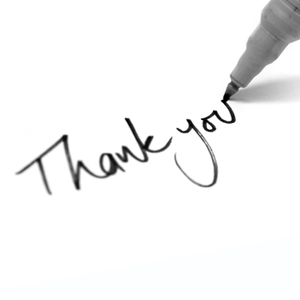Can Thank You Notes be BAD?
Just writing them is enough, right?
A few Sundays ago, I read an article in the Jobs section of my local newspaper, “The Journal News,”
“Don’t forget the ‘thank you.’” The author, Susan Ricker of careerbuilder.com, was discussing the attributes of a good thank you note after a job interview and it got me thinking about our thank you notes, the ones we all write to donors, event attendees, volunteers, and colleagues inside and outside of our organizations.
Are we getting the job done?
To answer that question we first have to ask, “What is my purpose?”
If your sole reason for writing the note is to let someone know they’ve touched you in some way and you appreciate it, without thought about building a relationship, that’s fine. For most of us, however, we’re trying to start or advance a relationship.
According to Ms. Ricker, “The best thank-you notes forward the discussion you started.” I LOVE that. Our thank-you notes should be a strategic step. So, before you pick up the pen to write a handwritten note, or press the first letter on your keyboard, think about what specifically you want your note to accomplish.
Here are some tips for writing a great thank-you note.
- “Make it real and authentic,” recommends Danielle Beauparlant Moser, author of “Focus: Creating Career & Brand Clarity.” I agree. I receive lots of lovely thank-you notes. The ones that move me are specific and concrete. “I especially appreciate your advice about…” Ms. Moser suggests, “If the person was standing in front of your, what would you say?”
- Speak to impact. We all want to make a difference, feel like we added value. “Your leadership of the development committee last week inspired a fellow trustee to do more. Joe just volunteered to host a vision meeting in his home. He told me it was because of you. Thanks so much for your dedication to the people we serve.” Or speak to promised impact. “Your investment in our organization will help the children we serve achieve…”
- Timely is best. It’s never too late to say thank-you (or I’m sorry). But both are much better received when they are timely. A sincere, authentic, specific, concrete thank-you that speaks to impact and arrives within 24 hours of the “gift” of time, treasure, expertise, wisdom, work, or advice is much more powerful than the one that arrives weeks later.
- Should the right medium. Ms. Ricker says, “Consider the personality” and style of the person or the “culture of the company” or foundation. Use the medium that is right for them. Personally, I think handwritten notes are best for just about everyone. Who doesn’t open a hand addressed note card? It stands out. But voice mail and email thank-you notes can also work.
I don’t think there is such a thing as a “bad” thank you note. But, why not “up your game,” and write really good ones.

Responses